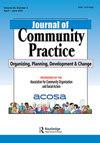A convergence of crises: how do we move community practice forward?
IF 1.2
Q2 SOCIAL WORK
引用次数: 0
Abstract
As we write this editorial, the COVID-19 pandemic continues, but has shifted to a different phase in which public health mandates, restrictions, and recommendations have lessened, vaccines are available for all ages six-months and older, and tentative conversations about what an endemic stage of the virus looks like have begun. Despite these changes, the virus case and positivity rates continue to fluctuate with the emergence of new variants and seasonal patterns of individuals engaging in travel and gatherings. Globally, as of early July 2022, there have been 547,901,157 confirmed cases of COVID-19, including 6,339,899 deaths, and over 12 billion vaccine doses have been administered. In the United States as of early July, 86,512,787 COVID-19 cases have been reported, including 1,010,089 deaths, and approximately 66% of the total US population has been fully vaccinated. Data suggests that more than 40% of US adults have had COVID-19, with 1 in 13 US adults experiencing “long COVID,” symptoms lasting three or more months after contracting the virus (Centers for Disease Control and Prevention, 2022). Additionally, the pandemic has amplified mental health concerns. In the first year of the pandemic, the global prevalence of anxiety and depression increased by 25%, with the most severe impact on young people, women, and people with preexisting physical health conditions (World Health Organization, 2022). During the pandemic in the U.S., approximately 4 in 10 adults have reported symptoms of anxiety or depression, up from 1 in 10 the year prior to the pandemic (Panchal et al., 2021). However, as an early pandemic report from the United Nations warned:危机的汇合:我们如何推进社区实践?
在我们撰写这篇社论的时候,新冠肺炎大流行仍在继续,但已经转移到一个不同的阶段,在这个阶段,公共卫生授权、限制和建议已经减少,所有六个月及以上的人都可以接种疫苗,关于病毒流行阶段的初步对话已经开始。尽管发生了这些变化,但随着新变种的出现以及旅行和聚会的季节性模式,病毒病例和阳性率仍在波动。截至2022年7月初,全球共有547901157例新冠肺炎确诊病例,包括6339899例死亡病例,已接种120多亿剂疫苗。截至7月初,美国已报告86512787例新冠肺炎病例,其中1010089例死亡,约66%的美国总人口已完全接种疫苗。数据显示,超过40%的美国成年人患有新冠肺炎,每13名美国成年人中就有1人患有“长期新冠肺炎”,症状在感染病毒后持续三个月或更长时间(美国疾病控制与预防中心,2022)。此外,新冠疫情加剧了人们对心理健康的担忧。在大流行的第一年,全球焦虑和抑郁的患病率增加了25%,对年轻人、女性和已有身体健康状况的人的影响最为严重(世界卫生组织,2022)。在美国疫情期间,大约十分之四的成年人报告有焦虑或抑郁症状,高于疫情前一年的十分之一(Panchal等人,2021)。然而,正如联合国早期的一份疫情报告所警告的那样:
本文章由计算机程序翻译,如有差异,请以英文原文为准。
求助全文
约1分钟内获得全文
求助全文
来源期刊

Journal of Community Practice
SOCIAL WORK-
CiteScore
2.40
自引率
18.20%
发文量
27
期刊介绍:
The Journal of Community Practice is an interdisciplinary journal grounded in social work. It is designed to provide a forum for community practice, including community organizing, planning, social administration, organizational development, community development, and social change. The journal contributes to the advancement of knowledge related to numerous disciplines, including social work and the social sciences, urban planning, social and economic development, community organizing, policy analysis, urban and rural sociology, community health, public administration, and nonprofit management. As a forum for authors and a resource for readers, this journal makes an invaluable contribution to the community"s conceptualization, applications, and practice.
 求助内容:
求助内容: 应助结果提醒方式:
应助结果提醒方式:


